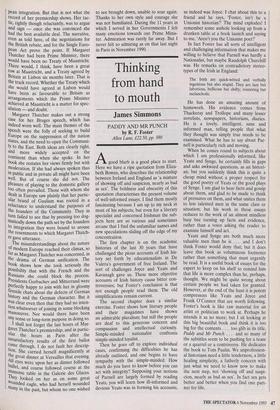Thinking from hand to mouth
James Simmons
PADDY AND MR PUNCH by R. F. Foster Allen Lane, £22.50, pp. 380
Agood blurb is a good place to start. Here we have a ripe quotation from Eliza- beth Bowen, who describes the relationship between Ireland and England as 'a mixture of showing off and suspicion, nearly as bad as sex'. The boldness and obscurity of this quotation characterises the present volume of well-informed essays. I find them mostly fascinating because I am up to my neck in most of his subjects; but even for a literary specialist and concerned Irishman the sub- jects here are so various and sometimes arcane that I find the unfamiliar names and new speculations sliding off the edge of my concentration.
The first chapter is on the academic histories of the last 30 years that have challenged the pious accounts of Irish his- tory set forth by educationalists in De Valera's government of free Ireland. The sort of challenges Joyce and Yeats and Kavanagh gave us. These more objective accounts of Irish history cause bitter con- troversies; but Foster's conclusion is that not enough people read them. The old simplifications remain current. The second chapter does a similar exercise. Foster shows how literary people and their magazines have shown an admirable pluralism; but still the people are deaf to this generous concern and compassion and intellectual curiosity. Simple-minded nationalist confronts simple-minded loyalist. Then he goes off to explore individual cases, confirming the difficulties he has already outlined, and one begins to have sympathy with the simple-minded. How much do you have to know before you can act with integrity? Supposing your notions of Parnell are largely formed by reading Yeats, you will learn how ill-informed and devious Yeats was in forming his accounts, as indeed was Joyce. I chat about this to a friend and he says, 'Foster, isn't he a Unionist historian?' The mind explodes! I remember some asshole looking up from a drunken table at a book launch and saying to me, 'Aren't you the Unionist poet?'
In fact Foster has all sorts of intelligent and challenging information that makes me willing to believe that Parnell was hardly a Nationalist, but maybe Randolph Churchill was. He remarks on contradictory stereo- types of the Irish in England: The Irish are quick-witted and verbally ingenious but also stupid. They are lazy but laborious, bellicose but shifty; roistering but melancholic.
He has done an amazing anount of homework. His evidence comes from Thackeray and Trollope and many lesser novelists, newspapers, historians, diaries. He is a lovely, intelligent, sane and informed man, telling people that what they thought was simply true needs to be examined. What he has to say about Par- nell is particularly rich and moving.
When he comes round to subjects about which I am professionally informed, like Yeats and Synge, he certainly fills in gaps and asks awkward questions, as an histori- an; but you suddenly think this is quite a cheap mind without a proper respect for the good poetry of Yeats or the good plays of Synge. I am glad to hear facts and gossip about them, and glad to be made to think of pressures on them, and what unites them to less talented men in the same class or situation; but his work in these essays reduces to the work of an almost mindless busy bee turning up facts and evidence, rather than a voice asking the reader to examine himself and act.
Yeats and Synge are both much more valuable men than he is . .. and I don't think Foster would deny that; but it does leave this book as voluminous footnotes rather than something that must urgently be read. It is a useful book of essays for the expert to keep on his shelf to remind him that life is more complex than he, perhaps, thought. We might be quite wrong about certain people we had taken for granted. However, at the end of the hunt it is potent compressors like Yeats and Joyce and Frank O'Connor that are worth following. Foster's book is like raw material for an artist or politician to work at. Perhaps he intends it as no more; but I sit looking at this big beautiful book and think it is too big for the contents . . . too glib in its title, Paddy and Mr Punch . . . and so many of the subtitles seem to be pushing for a tease or a quarrel or a controversy. He dedicates the book to Tom Paulin. We unprofession- al historians need a little tenderness, a little healing simplicity, a fatherly concern with just what we need to know now to make the next step, not 'showing off and suspi- cion, nearly as bad as sex'. In fact sex gets better and better when you find one part- ner for life.










































































 Previous page
Previous page